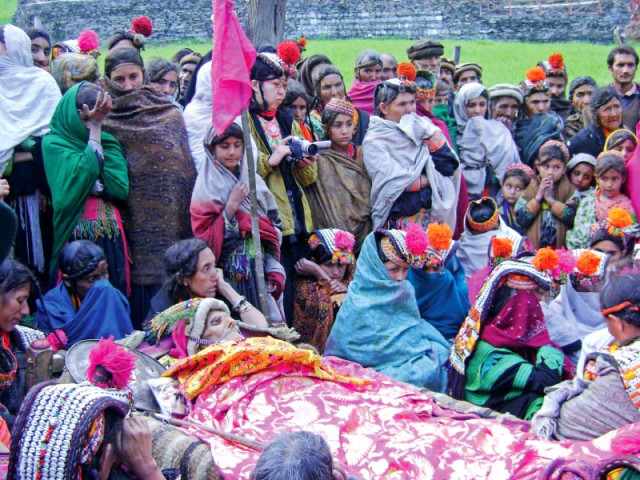Celebrating death: A festive goodbye
For the Kalashas, death is about singing, dancing and extravagant funerals to celebrate the deceased’s life.

Kalasha community surounds Bashara Khan’s body. PHOTO: MUHKAMUDDIN / EXPRESS TRIBUNE
In the center of Jushtkan (holy hall) in Rumbur, Kalash Valley, Bashara Khan’s dead body is resting on a charpoy. His face can be seen while his body is covered with a red shawl. Khan is wearing a garland of currency notes, not less than Rs 1,000 each. On his right side, his war equipment like lance and shield are placed. Khan is also being given food provisions on a platter that has been placed on his left side. These are for his final journey and include nutritious mulberries and walnuts.
The charpoy is encircled by men and women from three valleys of the Kalash community – Rumbur, Birir and Bumburet. The close female relatives of the deceased have not covered their heads. They are all listening to the cleric who is speaking about Khan’s services to the tribe. The people attending the funeral pay tributes to Khan and sing his praises. They are beating drums, blowing whistles, singing and dancing around the body.
There are various ways people around the world pay tribute to their dead, and the rites of passage in Kalash Valley are unique, to say the least.
A Kalash elder and fortune-teller, Kadirik, goes back in history and shares that these rites date back to 4,000 years. He says this distinguishes the Kalash from other religions. “In the early days the Kalashas would mourn at funerals and would also wail,” says Kadirik. But Sajigor, the god of death, did not like this. Kadirik explains that one day, a command came down from the sky, ordering the Kalashas to bid farewell to their dead by dancing and singing. “It is our belief that the more sadness expressed at funerals, the more troubles the Kaashas will have to face.” Since that day, the Kalashas have been celebrating funerals instead of mourning.
The celebrations also depend on the gender of the deceased, apart from his or her status in the tribe. When a male Kalasha dies, drum beating and dance as well as a feast is the norm. But when a woman dies, drum beating and dancing are excluded. Moreover, very few people attend funerals of women and children.
Some young Kalasha men express respect to the deceased and solidarity with the family members through aerial firing. The celebrations and series of praises are carried out for three days until the last services, when the body is finally buried.
Earlier, the Kalashas would lay the dead body in a wooden coffin-like trunk and place it anywhere rather than burying it. But with the growth in population and to avoid air pollution caused by rotting bodies, they have started burying the bodies.
An expensive custom
The Kalashas spend a lot of money on funerals. At times, the expenditures go above a million rupees. They even borrow money to arrange funerals. They are pushed into more debts if another funeral is to be arranged. Because of this, they have to sell their pieces of land and property at throwaway prices.
While speaking to The Express Tribune, Maqsood-ul-Mulk said that the Kalashas spend beyond their means on funerals. Mulk belongs to the royal family of Chitral that ruled the region for 500 years, from 1456 to 1956. “The Kalash tribe is not poverty-stricken. They make a lot of money but do not save anything,” shared Mulk. For this reason, he added that their standard of living is low.
According to Kalash folktales, the grandest feast ever in the last six to seven generations was arranged at the funeral of Jawasi Kalash, a renowned tribal elder. It continued for seven days. Drum beating and dancing were a part of it and the guests consumed a lot of liquor. Moreover, numerous cattle and tons of ghee and cheese were presented to the funeral attenders.
Today, Kalasha families offer grape water to people attending a funeral, which is a favourite of the tribe. For the past few years, the affluent members of the community have started to help poor Kalashas on funerals. This has led to saving people from having to take heavy loans.
Published in The Express Tribune, April 27th, 2014.



















COMMENTS
Comments are moderated and generally will be posted if they are on-topic and not abusive.
For more information, please see our Comments FAQ